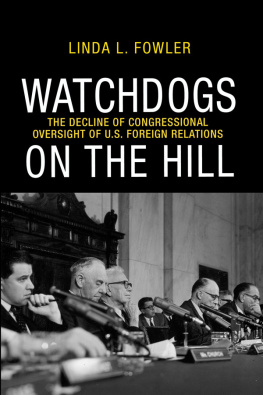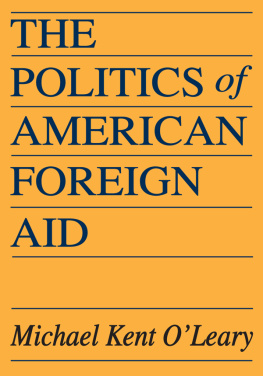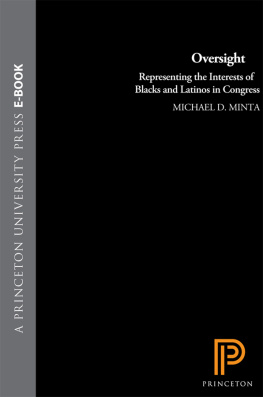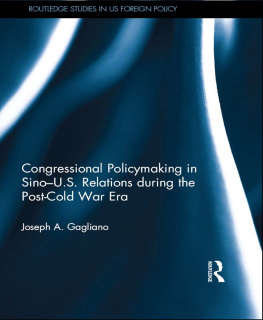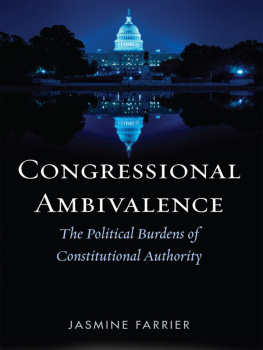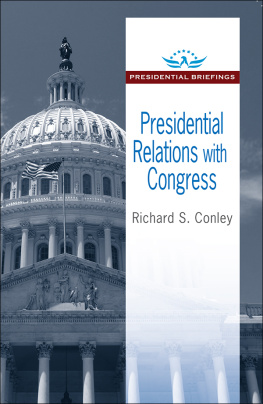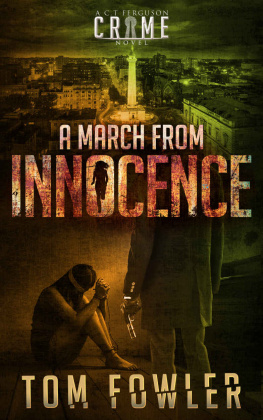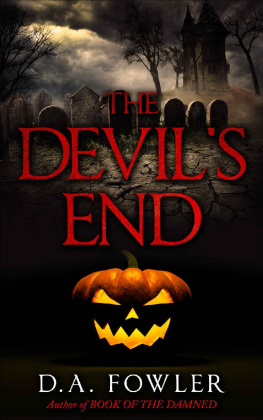Copyright 2015 by Princeton University Press
Published by Princeton University Press, 41 William Street, Princeton, New Jersey 08540
In the United Kingdom: Princeton University Press, 6 Oxford Street, Woodstock, Oxfordshire OX20 1TW
press.princeton.edu
Cover photograph: Senate Foreign Relations Committee, ca. 19631969. From left: Frank Church, Frank Carlson, George Aiken, Bourke Hickenlooper, J. W. Fulbright (chair). Courtesy of U.S. Senate Historical Office.
All Rights Reserved
Library of Congress Cataloging-in-Publication Data
Fowler, Linda L., 1945
Watchdogs on the hill : the decline of congressional oversight of U.S. foreign relations / Linda L. Fowler.
pages cm
Includes bibliographical references and index.
ISBN 978-0-691-15161-8 (hardback) ISBN 978-0-691-15162-5 (paperback)
1. Legislative oversightUnited States. 2. International relations. 3. United StatesForeign relations. 4. United StatesPolitics and government. I. Title.
JK585.F69 2015
328.730746dc23
2014044323
British Library Cataloging-in-Publication Data is available
This book has been composed in Minion Pro
Printed on acid-free paper.
Printed in the United States of America
10 9 8 7 6 5 4 3 2 1
Preface
I BEGAN THIS BOOK IN 2005 moved by concern for the lack of congressional oversight of the wars in Iraq and Afghanistan. As I reviewed the sweep of more than sixty years of legislative involvement in U.S. foreign policy after World War II, I concluded that key Senate committees with responsibility for oversight of the executive showed an unprecedented lack of monitoring during a major conflict and a failure to establish accountability after hostilities ceased. I wanted to make sense of these patterns, as a scholar, a citizen, and a teacher committed to helping students understand their government. What accounted for the decline of national security oversight, and what can we reasonably expect from Congress in light of past history and current political conditions?
My first encounter with congressional oversight of foreign policy occurred years ago, however, when I served as a young staffer in the House of Representatives at the height of the conflict in Vietnam. By the time I arrived on Capitol Hill in the summer of 1969, U.S. troop levels in Southeast Asia had peaked at over half a million, and total American battle deaths had exceeded forty-five thousand. After assuming office, President Richard Nixon had undertaken a series of initiatives: peace talks in Paris, secret bombings of Cambodia, clandestine meetings in Hanoi between Henry Kissinger and the North Vietnamese, and drawing down troops, eventually leading to the Vietnamization of combat operations. Protests consumed college campuses, and stories of atrocities, such as the 1968 massacre at My Lai, had appeared in the press. Increasing numbers of respectable, law-abiding citizens joined student dissidents and more radical critics of the government in the streets. While the country was unraveling, I grappled with a stew of contradictory feelings: anger that my husband had been drafted into the Marine Corps to serve in a war we both opposed; sorrow over the telephone-book-sized list of casualties that arrived on my desk each morning; grudging respect for my boss, who supported the war, but was one of only three members in Congress at the time with a close male relative serving in Vietnam; and disdain for a moribund institution that put the Speakers gavel and important committee chairs in the hands of octogenarians.
The primary venues for dissent, apart from the streets, were the hearing rooms in Congress. Several passionate war opponents had gained seats in Congress, but they had been unable to bring legislation forcing withdrawal from Vietnam to the floor. Party leaders endeavored to mask the deep fault line in the partys ranks between hawks and doves by preventing amendments and roll call The Hill was relatively quiet amid the domestic tumult as lawmakers waited to see whether Nixon really had a peace plan.
The presidents approval of incursions into neutral Cambodia in the spring of 1970 catalyzed public outrage, and protesters planned massive rallies for a weekend in early May. Rumors of attacks by the violent Weathermen organization buzzed through the city. Heading to the Rayburn Building garage to get my car that Friday evening, I was dumbfounded at the sight of hundreds of paratroopers and large supplies of military equipment filling the vast underground space. I learned later that other units had been hidden around the city. The troops had arrived by airlift to maintain order in the capital, and the peoples House had become a battle station. I picked my way to the car and sat, stunned, amid the noise of walkie-talkies and jeep engines. My strong memory of the U.S. government preparing for war against its own citizens still reminds me why the framers rightly feared concentration of power in the presidency.
Today, some of my students have been in harms way or have returned from combat in Iraq and Afghanistan to enroll at Dartmouth as veterans. Like those of my generation, they wonder if their government exercised due diligence about the necessity of prolonged war, if their efforts made the nation more secure, and if their fellow citizens truly understood their sacrifices. Surely, the nations elected representatives owed them a thoughtful review of U.S. involvement in another lengthy land war in Asia.
Instead, a state of confusion prevailed in Washington. Fears of an imperial presidency, which reemerged with the threat of global terrorism, became mired in partisan battles about the policies of individual presidents. Democrats, eager to rein in George W. Bush after the 2006 election, became quiescent during Barack Obamas term. Republicans, ready to concede vast powers to a GOP commander in chief, turned to the much-despised War Powers Resolution in 2011 to challenge a Democrat in the White House over Libya. As the president considered military intervention in Syria in 2013, some members from both parties claimed prerogatives for Congress, but their efforts ended abruptly when President Obama found a diplomatic means of diffusing the controversy of dealing with the Syrians use of chemical weapons. Missing from all recent debates about congressional and executive war powers has been serious examination of how the internal workings of the legislature have undermined Congresss capacity to play a responsible role in foreign affairs.
I have undertaken this project because I believe that the threats of global terrorism have exposed internal perils to Americas democracy. For me, claims about the legislatures constitutional powers in national security depend upon hardheaded analysis of its institutional capabilities. In this respect, I side with Madison, who had limited faith in the paper barriers erected by the Constitution and relied on ambition within each branch to preserve its prerogatives. Surveying the record of the past six decades, I see a presidency that has taken on more than it can reasonably handle and a legislature caught up in members personal and partisan agendas. In effect, there is too much foreign policy ambition in the White House and too little on Capitol Hill.
I harbor no illusions that a legislative branch more engaged in oversight will solve the global challenges confronting the American democracy. Congress is an imperfect institution representing an imperfect people, and it will always be prone to parochialism, shortsightedness, and demagoguery. Nevertheless, Congress can bring the collective wisdom of a diverse nation to bear on difficult problems requiring shared commitment and sacrifice. Through public hearings, its committees can establish an orderly, transparent process that promotes the rule of law and educates the public. Through executive sessions, its designated watchdogs can engage in troubleshooting and negotiation with the executive branch. Sustained evaluation of presidential decisions is especially vital during lengthy conflicts. I hope that shedding light on congressional review of U.S. foreign policy will help citizens and policy makers understand why oversight is vital to ensuring democratic accountability in foreign affairs, why it has become increasingly dysfunctional, and how to think about fixing it.

